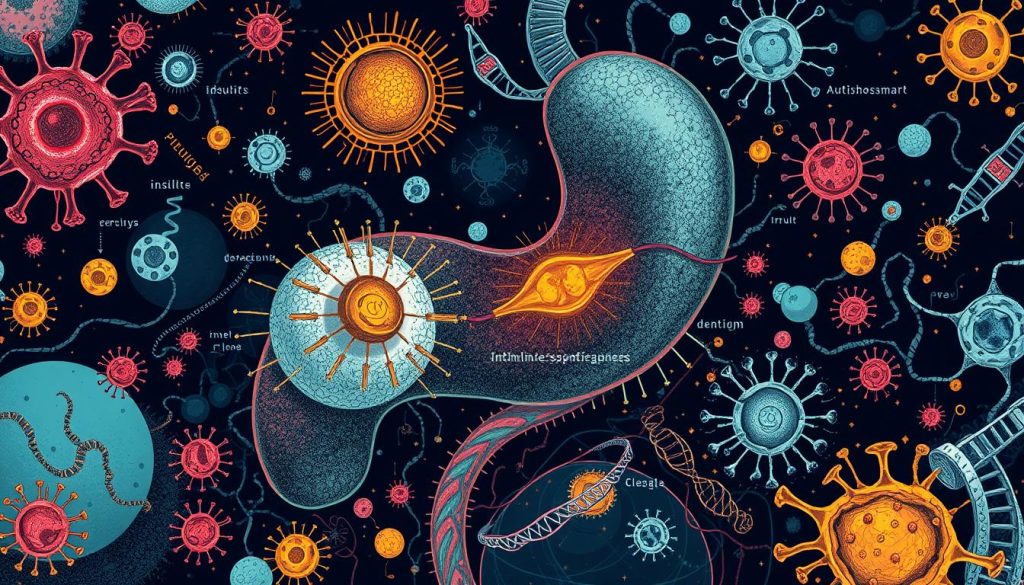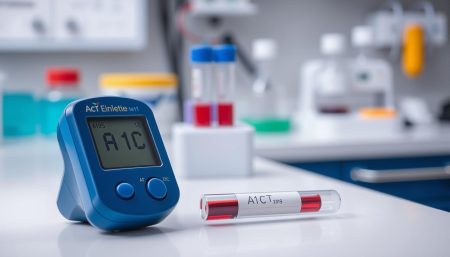The question of what causes type 1 diabetes mellitus has puzzled doctors and researchers for years. Our article explores the many factors that lead to onset of type 1 diabetes. This journey is not just for learning; it’s a quest to grasp a disease that changes lives worldwide.
We aim to explain the complex causes of type 1 diabetes. We look at genetics, environment, and lifestyle to find the truth. This will help us understand why type 1 diabetes happens.
As we dive into type 1 diabetes, we face the task of sorting out facts from myths. Type 1 diabetes is a puzzle in human biology. But with knowledge, we can manage and maybe even prevent it.
Join us as we share the latest findings and real-life stories. This will give you a deeper look into scientific research and personal experiences.
Understanding Type 1 Diabetes Mellitus
Type 1 diabetes is a serious condition that needs a deep understanding for good care and diagnosis. It happens when the body can’t make enough insulin because of an autoimmune attack on the pancreas. Knowing how it starts, including the development of type 1 diabetes and type 1 diabetes causes, is key for doctors and patients.
The Basics: Definition and Diagnosis
Type 1 diabetes, once called juvenile diabetes, mainly hits kids and young adults. People with it need insulin shots every day to live. Doctors use tests like fasting blood glucose and the glucose tolerance test to find it.
These tests check blood sugar levels and how the body handles glucose after fasting.
Classification: Distinguishing Type 1 from Type 2
Type 1 and Type 2 diabetes both deal with blood sugar, but they’re different. Type 1 is caused by the immune system attacking insulin-making cells. Type 2 is about the body not using insulin well.
This difference is important because treatments are different for each type.
Both genes and the environment play a part in getting Type 1 diabetes. Knowing this helps in finding ways to stop diabetes from getting worse. It also guides research into new treatments.
Spotting Type 1 diabetes early is critical. Delayed diagnosis can cause serious problems like diabetic ketoacidosis. Look out for signs like needing to pee a lot, being very thirsty, feeling tired, and losing weight without trying.
If you notice these symptoms, see a doctor right away for tests and advice.
What Causes Type 1 Diabetes Mellitus
Exploring what causes type 1 diabetes mellitus shows a mix of genetics, environment, and autoimmunity. This part looks at these different factors that lead to this disease.
The main reasons for type 1 diabetes mellitus include the loss of insulin-making cells in the pancreas. This loss is often due to a mix of genetics and environment. But finding the exact causes can be hard because they differ from person to person.
- Genetic Susceptibility: People with a family history of type 1 diabetes are more at risk.
- Environmental Factors: Being exposed to certain viruses and early diet can play a part.
- Autoimmune Conditions: Having other autoimmune diseases can increase the risk too.
Knowing the triggers of type 1 diabetes is key to finding ways to prevent and treat it. The table below shows how these factors work together to cause type 1 diabetes:
| Factor | Description | Impact on Diabetes |
|---|---|---|
| Genetic | Inherited traits that make people more likely to have immune system problems. | Significant |
| Environmental | Being exposed to viruses, early diet, and where you live. | Moderate to High |
| Autoimmune | The immune system attacking its own insulin-making cells. | Critical |
In summary, studying what causes type 1 diabetes mellitus is complex and ongoing. Each factor is important for understanding the whole picture. This could lead to new ways to prevent or delay type 1 diabetes.
Genetic Predisposition to Type 1 Diabetes
Looking into the genes that lead to type 1 diabetes gives us key insights. It shows how some people might be more likely to get this autoimmune disease. We’ll explore how genes play a role in developing type 1 diabetes.
Inherited Risk: Family History’s Role
Family history is a big risk factor for type 1 diabetes. If you have a family member with it, you’re at higher risk. This shows how important genes are in passing on the risk.
Knowing this, families can get tested early. This helps catch type 1 diabetes before it starts.
Genes Associated with Type 1 Diabetes
Scientists have found important genes linked to type 1 diabetes. These genes help us understand how the immune system affects insulin. By testing these genes, doctors can figure out who’s at higher risk.
Studying these genes and how they react to the environment is key. It helps us create better treatments and prevention plans. Knowing about type 1 diabetes genes helps us fight the disease better. It also gives people hope for a healthier future.
Autoimmune Factors Contributing to Type 1 Diabetes
Type 1 diabetes starts with an autoimmune disorder. The immune system mistakenly attacks the body’s cells. This mainly harms the insulin-making beta cells in the pancreas, thanks to autoimmune triggers in diabetes.
The immune system’s attack causes a lot of beta cell destruction. This is a main reason for Type 1 diabetes. Knowing these factors helps in early diagnosis and treatment. Researchers say certain autoantibodies in type 1 diabetes show this harmful autoimmune response.
The Immune System’s Attack on Beta Cells
Type 1 diabetes’s cause is a mix of genetics and environment. This leads to the immune system destroying beta cells. Studies on autoimmune triggers in diabetes show how these cells, key for insulin, are seen as threats and destroyed.
Autoantibodies and Their Predictive Value
Identifying autoantibodies in type 1 diabetes has been a big step in early diagnosis. These autoantibodies are proteins that attack the body’s beta cells. Watching these markers helps predict risk and prevent beta cell destruction. A study also links these autoimmunity issues to hair loss in diabetics.
| Autoantibody | Role in Diabetes | Significance in Early Detection |
|---|---|---|
| ICA | Indicates immune attack on islet cells | Crucial for early stage diagnosis |
| GADA | Autoimmune response to glutamic acid decarboxylase | Common in adult-onset diabetes |
| IA-2A | Antibodies to tyrosine phosphatase-related insulinoma antigen 2 | Predicts a more rapid progression |
| ZnT8A | Target zinc transporter 8 in beta cells | Found in some genetic variants |
Environmental Triggers of Type 1 Diabetes
This section looks into how our environment might trigger Type 1 Diabetes. It explores the role of viruses and the hygiene hypothesis in this process. These factors are key in current research on Type 1 Diabetes.
Viruses: Culprits or Catalysts?
Recent studies suggest a link between viruses and diabetes. They think some viruses might speed up the autoimmune process in Type 1 Diabetes. Researchers found enteroviruses, like Coxsackievirus, in many new patients.
This finding suggests viruses could start or speed up damage to pancreatic cells.
The Hygiene Hypothesis: Cleanliness vs. Immunity
The hygiene hypothesis says a lack of early exposure to germs might lead to allergies. It also suggests a link to autoimmune diseases like Type 1 Diabetes. It’s thought that too clean an environment might lead to these diseases.
This idea raises questions about finding the right balance between cleanliness and immune challenges. It’s important for preventing autoimmune conditions.
| Viral Infection | Impact on Diabetes Risk | Relevance to Type 1 Diabetes |
|---|---|---|
| Coxsackievirus | Potentially increases risk | Direct correlation in numerous studies |
| Mumps virus | Varied impact | Less consistent findings |
| Rotavirus | Suggests possible prevention through vaccination | Intriguing links in some research; more data needed |
Diet and Nutritional Influence on the Onset of Type 1 Diabetes
Research is growing on how diet affects Type 1 Diabetes. Scientists look into nutritional risk factors and diabetes diet’s impact. They find early diet choices are key.
Experts focus on breastfeeding, vitamin D, and when to introduce foods to babies. These early steps might protect against or trigger Type 1 Diabetes.
- Breastfeeding might protect against Type 1 Diabetes, thanks to mom’s antibodies.
- Vitamin D, from food or sun, helps control the immune system. It could help or harm against diabetes.
- Research also looks at gluten and diabetes, showing diet’s role in immune system growth.
Studies aim to understand these links better. Here are some findings:
| Nutrient/Practice | Impact on Diabetes Risk | Study Findings |
|---|---|---|
| Breastfeeding (>6 months) | Potentially lowers risk | Shows correlation with delayed onset of Type 1 Diabetes symptoms |
| Vitamin D intake | May modulate immune responses | Higher Vitamin D levels linked to decreased risk of autoimmune reactions |
| Early Gluten Introduction | Risk factor variation | Some studies show increased risk with earlier gluten introduction, others find no significant relations |
Understanding diabetes diet’s impact and nutritional risk factors helps doctors. They can give dietary advice to lower Type 1 Diabetes risk.
The Gut Microbiome and Its Role in Diabetes Development
Research shows a link between gut bacteria and diabetes. It suggests that changing our gut health could prevent diabetes. This part looks at how gut bacteria affect diabetes risk and treatment, focusing on intestinal flora and probiotics.
Intestinal Flora: A Balancing Act
The balance of gut bacteria is key to our health. It affects our immune system, metabolism, and diabetes risk. A healthy gut helps control blood sugar, which is important for diabetes prevention and management.
Understanding how gut bacteria work with our body’s metabolism is vital. It helps in finding ways to manage and prevent diabetes.
Probiotics and Diabetes: Is There a Connection?
Studies are looking into probiotics for diabetes prevention. They think these good bacteria can improve our metabolic health and blood sugar control. Probiotics might change our gut bacteria, helping our body use insulin better and manage glucose.
This research makes probiotics a hopeful tool against diabetes. It shows we need more studies to understand their benefits and how they work.
The Mystery Behind the Rising Incidence of Type 1 Diabetes
The world is facing a big problem with increasing rates of diabetes. Looking into the epidemiology of type 1 diabetes helps us understand why this is happening. The public health sector might have answers, with strategies for prevention and early detection.
Trends and Patterns: A Growing Concern
There’s a clear rise in type 1 diabetes, mainly among the young. This trend is a big public health issue. It makes us think about lifestyle, environment, and genetics that might play a role.
Public Health Perspective: Possible Prevention Strategy
To tackle public health and diabetes, we need a mix of community education, lifestyle changes, and screenings. These steps could help us manage type 1 diabetes risks better.
Prenatal and Early Life Factors
Looking into Type 1 diabetes, we focus on early life risk factors. We see how prenatal influences diabetes risk in kids. Studies show that a mom’s health during pregnancy is key for her child’s health, including diabetes risk.
Specific conditions like gestational diabetes and the metabolic environment in pregnancy can lead to higher birth-related diabetes risks.
Exploring further, early life risk factors include genetics, birth weight, and nutrient exposure in pregnancy. The table below shows how these prenatal and birth factors increase Type 1 diabetes risk.
| Prenatal Factor | Incidence of Type 1 Diabetes |
|---|---|
| High birth weight | Increased risk |
| Maternal gestational diabetes | Higher risk in offspring |
| Early gestational malnutrition | Moderate risk increase |
This data highlights the need to manage birth-related diabetes risks by watching maternal health and prenatal conditions. The effects of these factors on a child’s early development are significant. They can lead to diabetes, showing the importance of prenatal care and early risk assessment.
Geographical Variations in Type 1 Diabetes Occurrence
Looking into geographic diabetes patterns shows big differences in Type 1 Diabetes rates around the world. This part explores location-based diabetes statistics to see how environment, culture, and economy affect regional diabetes risk.
Type 1 Diabetes isn’t spread evenly worldwide. Some places, like Northern Europe, have much higher rates than others, like Southeast Asia. Knowing these differences helps us create better health plans and policies.
- Climate variations and Vitamin D synthesis
- Genetic susceptibilities distinct to populations
- Differences in diet and gut microbiota across geographies
- Healthcare accessibility and diagnosis practices
These elements shape the global pattern of diabetes cases. Using regional diabetes risk data in global health plans could make prevention and management more effective. This way, we can meet specific needs better.
| Region | Type 1 Diabetes Cases per 100,000 Individuals |
|---|---|
| Northern Europe | 24 |
| Southeast Asia | 1 |
| North America | 20 |
| Australia | 22 |
Genetics are part of Type 1 Diabetes, but location-based diabetes statistics show environment and lifestyle matter too. This mix needs more study. By combining data on regional diabetes risk and geographic diabetes patterns, we can find better ways to fight Type 1 Diabetes worldwide.
Ethnic and Racial Disparities in Type 1 Diabetes Causes
The study of ethnic disparities in diabetes shows big differences in Type 1 diabetes among different races and ethnic groups. It’s key to understand these differences to create better care for diabetes in diverse populations.
Research on racial patterns type 1 diabetes found that some groups, like African Americans, Latinos, and Native Americans, get Type 1 diabetes more often. This shows how genetics, environment, and healthcare access play a role in these differences.
- Genetic susceptibility to autoimmune reactions leading to Type 1 diabetes
- Differences in environmental and dietary exposures
- Disparities in healthcare access and quality
Creating special outreach and education programs is vital. They must respect cultural and language needs to help manage the disease better.
To tackle these disparities, we need a wide-ranging strategy. This includes pushing for more resources, community-specific education, and detailed data on diabetes in diverse populations. Closing the gap in diabetes care is a major challenge in healthcare today.
In summary, studying ethnic disparities in diabetes shows we need care plans made for each patient. It also calls for changes in public health policies to meet the unique needs of diverse populations.
The Impact of Lifestyle Choices on Risk of Developing Type 1 Diabetes
The connection between diabetes and lifestyle is complex. It shows how our daily choices can either increase or decrease the chance of getting type 1 diabetes. We’ll look at how our lifestyle affects type 1 diabetes prevention and managing risk factors.
Being active and exercising regularly is key for good health. It helps control blood sugar and may lower the risk of type 1 diabetes. On the other hand, a sedentary lifestyle can increase the risk of diabetes and its complications.
- Daily moderate exercise — Reduces risk factors and supports metabolic efficiency.
- Balanced nutrition — Eating less processed food and more fruits, vegetables, and whole grains helps prevent type 1 diabetes.
- Stress management — Too much stress can harm the immune system and may lead to autoimmune diseases like type 1 diabetes.
Lifestyle choices are important, but they’re just one part of the picture. Genetics and the environment also play big roles in diabetes risk. Yet, making better lifestyle choices is a key step in type 1 diabetes prevention.
Knowing how lifestyle affects diabetes risk helps us make healthier choices. It encourages a proactive approach to health. This includes watching and adjusting lifestyle-related risk factors for those at risk.
Stress and Psychological Factors as Possible Triggers
Recent studies show a strong link between psychological stress and diabetes. They suggest that emotional issues can affect diabetes management and even cause it. The connection between stress-induced diabetes is becoming clearer, pointing to both ongoing stress and sudden emotional events.
Long-term stress can lead to diabetes through several ways. Stress hormones like cortisol and adrenaline can mess with how our body handles sugar. This can cause blood sugar levels to rise, a key sign of diabetes. So, emotional triggers diabetes by making it harder for our body to control sugar levels.
The link between ADHD and stress helps us see how ongoing conditions can make us more likely to get diabetes. It shows why taking care of our mental health is key to keeping our blood sugar in check.
| Psychological Factor | Impact on Diabetes Risk |
|---|---|
| Chronic Stress | Increases glucocorticoids that raise blood sugar |
| Acute Emotional Distress | May trigger hyperglycemic episodes |
| Anxiety and Depression | Associated with poor blood glucose management |
| Stressful Life Events | Potentially accelerates onset of metabolic syndrome |
In summary, there’s a clear connection between psychological stress and diabetes. Both ongoing and sudden stress can affect our blood sugar levels. Finding ways to manage stress is key to avoiding stress-induced diabetes.
The Role of Insulin Resistance in the Onset of Type 1 Diabetes
Insulin resistance is often linked with Type 2 diabetes. But, research is now exploring its role in Type 1 diabetes. Type 1 diabetes is seen as an autoimmune disease. Yet, studies suggest insulin resistance might also play a part in its onset.
Early diabetes signs in Type 1 can be similar to Type 2. This has led to new ideas about how diabetes starts. It shows insulin resistance and autoimmune responses might work together in complex ways.
Understanding diabetes’ complex nature is key. We need to see how insulin resistance affects Type 1 diabetes. Here’s a comparison of metabolic factors in Type 1 and Type 2 diabetes:
| Aspect | Type 1 Diabetes | Type 2 Diabetes |
|---|---|---|
| Primary Dysfunction | Autoimmune destruction of beta cells | Insulin resistance |
| Insulin Production | Decreased due to cell loss | Initially normal or increased |
| Early Signs | Rapid onset of symptoms | Often gradual, may be subtle |
| Metabolic Anomalies | Presence of autoantibodies | Often associated with obesity |
| Response to Insulin Therapy | Essential for survival | Used when lifestyle changes and metformin are insufficient |
This table shows Type 1 and Type 2 diabetes have different causes and signs. But, insulin resistance might play a role in both. This understanding could lead to better treatments and early interventions.
Misconceptions About What Causes Type 1 Diabetes Mellitus
It’s important to clear up false ideas about type 1 diabetes. This section aims to improve diabetes education. We will address and debunk myths to help people understand the condition better.
Debunking Common Myths
Many believe eating too much sugar causes type 1 diabetes. But, type 1 diabetes is an autoimmune disease. It happens when the body attacks its own insulin-making cells. So, sugar isn’t the main cause. Diabetes myths debunked help reduce guilt and worry for patients and their families.
Educating the Public to Foster Understanding
Good diabetes education can lessen the stigma around the condition. It helps people understand type 1 diabetes better. By sharing true information and fighting false claims, we can support those with type 1 diabetes.
| Myth | Fact |
|---|---|
| Consuming too much sugar causes type 1 diabetes | Type 1 diabetes is an autoimmune disease, not directly caused by dietary sugar |
| Only children get type 1 diabetes | Type 1 diabetes can develop at any age, including adulthood |
| People with type 1 diabetes cannot lead normal lives | With proper management, individuals can lead full and active lives |
The Role of Medical Research in Understanding Type 1 Diabetes Causes
Understanding Type 1 diabetes is key to finding treatments and a cure. Research has made big steps, helping us learn more. This knowledge guides future studies towards better results.
Ongoing Studies and Future Directions
Research into Type 1 diabetes is growing, uncovering genetic, autoimmune, and environmental causes. Studies aim to find early detection markers and new treatments. New technologies in bioinformatics and genomics are pushing these studies ahead.
These advancements promise a future where medicine is tailored to each person. This could change how we treat diabetes.
The Quest for a Cure: How Understanding Causes Leads to Solutions
Finding a cure for Type 1 diabetes is the main goal. Research is working to prevent and reverse the disease. Stem cell research, immunotherapy, and beta cell regeneration are leading the way.
Every discovery in understanding causes brings us closer to a cure. We’re moving towards a world where Type 1 diabetes is no longer a problem.
| Research Area | Potential Impact | Current Status |
|---|---|---|
| Genomic Analysis | Identify genetic markers | Expanding with CRISPR technology |
| Immunotherapy Trials | Modulate immune response | Ongoing phase II trials |
| Beta Cell Regeneration | Restore insulin production | Early-stage clinical trials |
As we keep using these research breakthroughs, we’re getting closer to a cure. The mix of science and medicine is bringing us closer to a cure. We’re moving from just managing symptoms to actually healing.
Monitoring and Managing Risk Factors for Type 1 Diabetes
Keeping a close eye on managing diabetes risk is key. It starts with knowing the risk factors like genetics and environmental factors. Regular type 1 diabetes monitoring is essential.
Medical checks and personal health efforts are both important. Screening for autoantibodies can show early risk signs. Knowing your family’s diabetes history can lead to early lifestyle changes.
Lifestyle changes are vital in reducing diabetes risk. Eating right and exercising can boost overall health. A healthy diet may also help the immune system, which is important for Type 1 Diabetes.
Learning about health is also important. Keeping up with new research helps make better health choices. For those at high risk, staying proactive with health checks and doctor visits is key.
FAQ
Q: What are the primary causes of Type 1 Diabetes Mellitus?
A: Type 1 Diabetes Mellitus is caused by an autoimmune reaction. This reaction attacks and destroys insulin-producing cells in the pancreas. Factors like genetics, viruses, and lifestyle may trigger this response.
Q: How is Type 1 Diabetes distinguished from Type 2?
A: Type 1 Diabetes is an autoimmune condition that destroys insulin-producing cells. It often starts in childhood. Type 2 Diabetes, on the other hand, is linked to insulin resistance and usually develops later in life.
Q: Are there genetic risk factors associated with Type 1 Diabetes?
A: Yes, genetics play a big role in Type 1 Diabetes risk. A family history of the disease increases your chances. Certain genes in the HLA region are linked to a higher risk.
Q: Can viruses trigger Type 1 Diabetes?
A: Some research suggests viruses can trigger Type 1 Diabetes. They may start or speed up the autoimmune response that destroys pancreatic cells. More research is needed to understand this link.
Q: What is the hygiene hypothesis and how is it related to Type 1 Diabetes?
A: The hygiene hypothesis suggests a lack of early childhood infections may raise autoimmune disease risk. This includes Type 1 Diabetes. The debate continues, and more research is needed.
Q: How does nutrition affect the risk of developing Type 1 Diabetes?
A: Nutrition may play a role in Type 1 Diabetes onset, though the exact link is unclear. Some studies suggest early diet, vitamin D levels, and breastfeeding may affect risk.
Q: Is the gut microbiome linked to the development of Type 1 Diabetes?
A: Research suggests the gut microbiome may influence Type 1 Diabetes development. Studies are looking into how certain gut bacteria could affect the autoimmune response.
Q: Why is the incidence of Type 1 Diabetes increasing?
A: The increase in Type 1 Diabetes is not fully understood. Theories include environmental changes, diet, and genetics. Researchers are exploring these factors to find the cause.
Q: Could prenatal and early life factors affect the risk of Type 1 Diabetes?
A: Yes, prenatal and early life factors might influence Type 1 Diabetes risk. These include maternal health, environmental exposures, and birth weight. The impact is complex and under study.
Q: Are there geographical variations in Type 1 Diabetes occurrence?
A: Yes, Type 1 Diabetes prevalence varies by region. Differences might be due to genetics, environment, or lifestyle. Research aims to explain these disparities.
Q: How do ethnic and racial factors influence Type 1 Diabetes risk?
A: Ethnic and racial backgrounds can affect Type 1 Diabetes risk. Some groups have higher or lower rates. This may be due to genetics, immune function, or environmental factors.
Q: Can lifestyle choices impact the risk of Type 1 Diabetes?
A: Lifestyle choices may influence Type 1 Diabetes risk, though not as directly as in Type 2. They could affect immune function. The autoimmune nature of Type 1 Diabetes limits the impact of lifestyle choices.
Q: Do stress and psychological factors contribute to the onset of Type 1 Diabetes?
A: Stress and psychological factors may play a role in Type 1 Diabetes development. They could influence the immune system or hormonal balance. More research is needed to understand this connection.
Q: Is insulin resistance involved in Type 1 Diabetes?
A: Insulin resistance is common in Type 2 Diabetes but can also occur in Type 1. This is known as “double diabetes.” It combines autoimmune beta cell destruction with insulin resistance.
Q: What are common misconceptions about the causes of Type 1 Diabetes?
A: Many believe Type 1 Diabetes is caused by sugar, obesity, or lack of exercise. In reality, it’s an autoimmune disease not caused by lifestyle. Education is key to dispelling these myths.
Q: What role does medical research play in understanding Type 1 Diabetes causes?
A: Medical research is vital for understanding Type 1 Diabetes causes. Studies on genetics, immunology, and environment are essential. They aim to develop better treatments and a cure.
Q: How can monitoring and managing risk factors potentially help with Type 1 Diabetes?
A: Monitoring and managing risk factors can help identify those at high risk for Type 1 Diabetes. This includes maintaining vitamin D levels and understanding genetic susceptibilities. It may lead to earlier intervention or prevention.


















